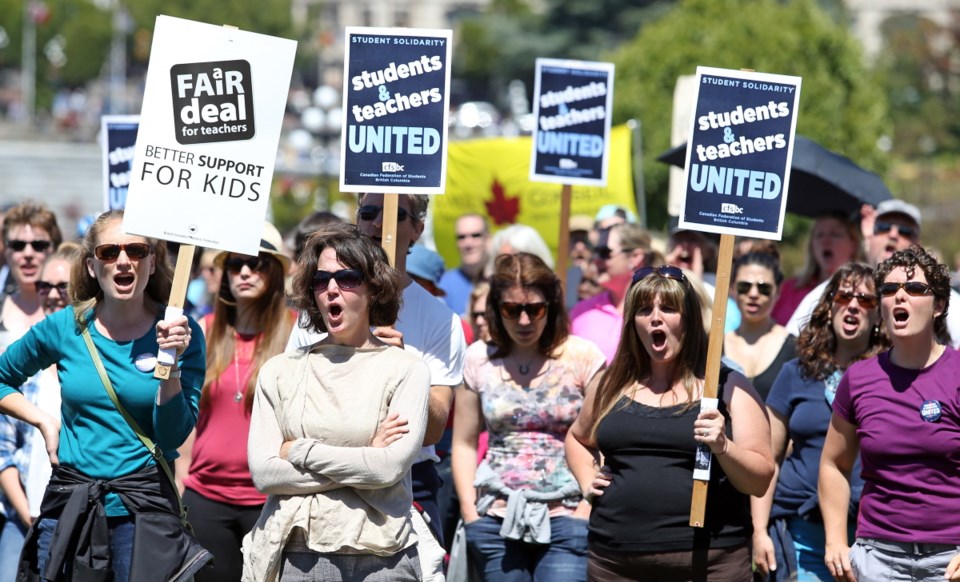 Teachers and the B.C. government seem to be one percentage point apart after three bruising weeks of strikes and lockouts.
Teachers and the B.C. government seem to be one percentage point apart after three bruising weeks of strikes and lockouts.
But the gap between the two sides is a lot bigger than that. It’s a gulf into which the rest of the school year will likely fall.
B.C. Teachers’ Federation president Jim Iker and government chief negotiator Peter Cameron presented lack-of-progress reports Monday, and it was the usual tiresome jumble of claims and counter-claims.
To paraphrase, Iker presented the case that the BCTF relaxed all its demands on the weekend, gave up all its dreams for a brighter future, cut its wage demand in half and generously provided a way out of the dilemma presented by the Supreme Court decision in January. In return for that, he said the government did nothing but sit on its hands for 48 hours until Sunday night, then “disingenuously” cut its own wage offer and rejected all their bright ideas.
MORE ON THIS: Teachers start provincewide strike today after talks fail
Cameron responded: “Misrepresenting.” “Derogatory.” “Misleading.” “False.” He accused the BCTF of breaching negotiating etiquette — as if anyone cares about that, by this point — and summed up the BCTF move as this: “They’ve come down from three or four times what everybody else got, to now just over two times what everybody else got.”
This kind of point-counterpoint listing of grudges and accusations is a little hard to take for most people with kids in school. Particularly since it’s been going on for 16 months.
It looks more and more as if there is one source for the myriad arguments that have raged since talks began and left both sides still miles apart. It’s the B.C. Supreme Court decision from January, which handed the BCTF a victory in a contract fight that stretched back 12 years.
The BCTF is using that decision as the basis to wring every nickel it can get out of the government, both in wages and in huge new contributions to ease class size and class composition issues. They’re not just negotiating one contract for the next few years. They’re trying to negotiate a retroactive makeup for more than a decade’s worth of judicially recognized mistreatment.
And the government, which is appealing the decision, is doing its level best to ignore the decision. Because acknowledging it would require the B.C. Liberals to capitulate and give away the store.
To recap, the court found in 2011 that the government acted unconstitutionally when it stripped the teachers’ contract in 2002. The government then tried to rewrite the law to bring it into line. But the BCTF took the second effort to court, as well. The court found again that the government had essentially cheated, negotiated in bad faith and secretly tried to provoke a strike in 2012 for its own advantage.
That decision by Justice Susan Griffin came after a year of negotiating in the current round. It was a gift from heaven for the BCTF, and a disaster for the government.
For instance, it sets the stage for thousands of grievances dating from 2002 to 2012 for staffing and class size policies that have been ruled illegal.
Iker said Monday the union offered the government an out in that regard. All those grievances would be withdrawn if the government creates a fund to pay for improvements all around. The figure would be huge.
For his part, Cameron said the BCTF thinks the old long-gone provisions will be inserted into a new contract if it wins the appeal. But he said the union is wrong; new contracts are the product of new negotiations.
He called the court decision a “roadblock.” But the BCTF obviously views it as a gateway to a lucrative reconciliation.
The problem is that it could take two more levels — Court of Appeals and Supreme Court of Canada — for the definitive word on whether Griffin’s decision stands.
That leaves the two exhausted, embittered sides locked in negotiations on a future contract with no clear understanding of how the past will factor into it.



